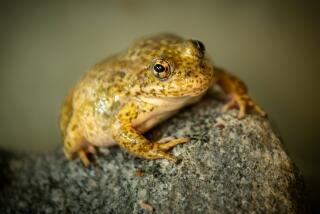Goliath Frogs Left in Dust in Hopping Derby
- Share via
ANGELS CAMP, Calif. — They came. They croaked. They choked.
Despite fears that their enormous size would let them hop all over the competition, huge African Goliath frogs entered by a Seattle man were middle-of-the-pack also-rans in the historic Calaveras County Frog Jump Jubilee that ended Sunday.
Only three of the exotic, overgrown amphibians even qualified to hop in the final round of the whimsical contest made famous in a Mark Twain short story. And in the final competition, they wound up more than 11 feet feet behind the winner, a California bullfrog entered by Gregg Jaschek of Concord, Calif.
Jaschek’s frog, “Help Mr. Wizard,” claimed the crown with a total jump of 19 feet, 3 inches; the best mark put up by an African Goliath in the finals was 7 feet, 10 inches.
But while the Goliath frogs flopped on the launching pad, they were a hit with Calaveras County Fair organizers and merchants in the small mining towns dotting this part of the Gold Country. Attendance at the fair was up more than 25% over last year, and all surrounding hotel rooms were sold out. The unusual croakers got the credit.
“It’s unbelieveable, fantastic,” said Jewel Lucken, marketing director for the 39th District Agricultural Assn., which runs the fair.
“I’ve been out in that broadcasting booth for 10 years and I’ve never seen anything like this crowd,” said her husband, Mearl, an insurance agent who doubles as fair announcer.
Andy Koffman, the Seattle animal importer who captured international attention by earlier this year proclaiming his intention to bring the Goliath frogs to Angels Camp from the west African nation of Cameroon, shrugged off the poor showing of his stable. He said it was a consequence of strict rules and cool weather.
“I came here to win, and if I would have won, it would’ve been great,” he said. “But even though I didn’t, it is still great. I really just came here to have fun.”
Spectators packing the amphitheater before the frog-jumping stage didn’t seem to mind that most of Koffman’s 27-frog stable was disqualified for being too big to fit onto the 8-inch-diameter launching pad, or that those juveniles small enough to fit could not manage respectable jumps.
Most ticket-holders gladly settled for the daily unofficial demonstration hops by Koffman’s charges. In one show Saturday, one 6-pound Goliath covered 21 feet, 9 inches in the regulation three hops. That eclipsed the standing world record of 21 feet, 5 inches set four years ago by Rosie the Ribiter, a 1-pound California bullfrog, but it was far short of the 40-foot individual leaps that Koffman promised.
“They didn’t jump 40 feet because we’ve had a couple of cold nights,” he explained. “These are equatorial frogs and they’re just not used to this cold weather.”
Nonetheless, other “frog jockeys” scoffed at their outsized competition, which managed best jumps of only 9 to 14 feet in four days of competition.
“They can’t jump,” said Kevin Sturm, 23, of Sunnyvale, Calif., whose domestic bullfrog, Cho Cho, had the contest’s longest jump--20 feet, 3 inches--going into Sunday’s finals.
“Since the big ones won’t fit onto the pads and the small ones can’t seem to jump past 14 feet, we’re not too worried about them,” Ardie Kendig-Higgins of Angels Camp said as the final round of jumping approached.
Koffman’s frogs weigh between 1 and 15 pounds, and range in size from 9 inches to 3 feet in length. The average domestic frog weighs about a pound and is about 8 inches long.
Koffman was less worried about the derision directed his way than about the fair organizers’ refusal to pay him for his appearance. Since using his entry in the Calaveras contest to create worldwide interest in his frogs--as well as an appearance on “The Tonight Show” with Johnny Carson--Koffman acquired an agent to book him and his amphibians into other fairs, boat shows and schools at fees ranging from $100 to $1,500.
Calaveras County Fair officials provided him with three recreational vehicles to house his entourage of 15 family members, friends, frog handlers and security guards. The officials also supplied space in the fair’s commercial hall annex where Koffman hawked Goliath frog T-shirts for $13 and $16 apiece.
But Koffman complained that the two fair musical headliners were paid $8,000 apiece, even though they were presumably less of a draw than his frogs. He also fretted that other frog jockeys resented all of the attention and special consideration he had received.
Most competitors, though, were less worried about Koffman and his complaints than about how to coax bodacious jumps from their frogs, which had been borrowed for a few days from swamps and rivers around the state in hopes of bringing them a measure of good-natured glory--and the first prize of $500.
Some kept their frogs cool and woke them with a warm-water dip before taking them on stage for their date with destiny. Others took the reverse route, letting the frogs warm up in the sun before waking them with cool-water spritzes. Most simply plucked a frog from a water-filled trash can and used body language and shouts to urge their amphibians on.
“Frog’s legs!” yelled one jockey, relying on his frog’s knowledge--and fear--of fine French cuisine.
“Dinner!” hollered another, in an ambiguous strategy accompanied by hand slaps next to his unimpressed frog.
“Go, baby, go!” screamed a young woman on the Angels Camp Froggers team, who gently flicked her frog on the rump to inspire three disappointing hops.
Winning and losing amphibians alike will be released after the fair ends, jockeys said. Most will be returned to where they were found.
“Let’s just say that we got ours at a canal somewhere down in the Central Valley,” said Sturm. “We won’t say where, because we hope to get the good jumpers again next year.”
More to Read
Sign up for Essential California
The most important California stories and recommendations in your inbox every morning.
You may occasionally receive promotional content from the Los Angeles Times.













